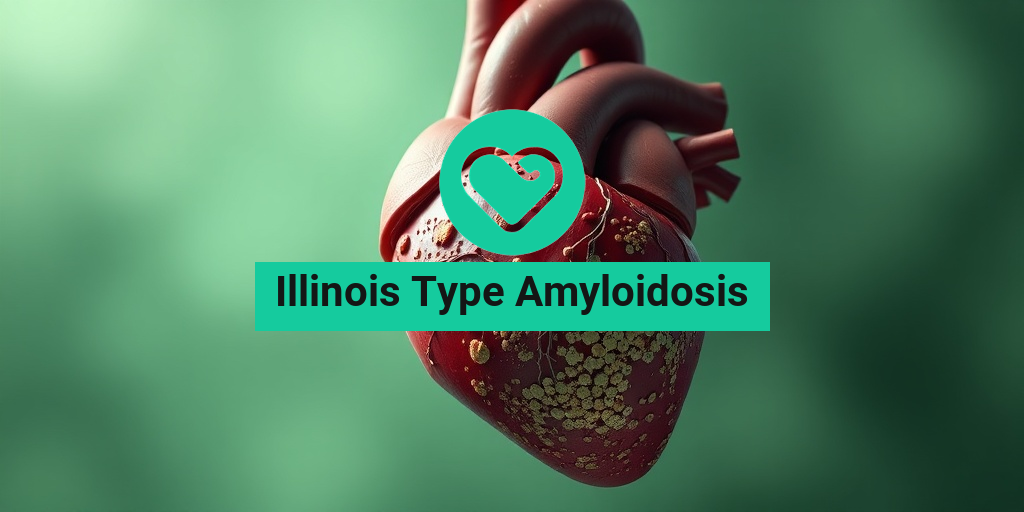What Is Illinois Type Amyloidosis?
Illinois Type Amyloidosis, a rare and complex condition, is a form of amyloidosis that primarily affects individuals in the state of Illinois. This disorder occurs when abnormal proteins, known as amyloid, accumulate in various tissues and organs, disrupting their normal function. The amyloid deposits can lead to serious health complications, making early diagnosis and treatment crucial.
Understanding Amyloidosis
Amyloidosis is not a single disease but rather a group of disorders characterized by the buildup of amyloid proteins. These proteins can originate from different sources, and their accumulation can affect various organs, including the heart, kidneys, liver, and nervous system. In the case of Illinois Type Amyloidosis, the specific type of amyloid protein involved is often linked to genetic factors or chronic inflammatory conditions.
Causes and Risk Factors
The exact cause of Illinois Type Amyloidosis remains unclear, but several factors may contribute to its development:
- Genetic predisposition: Some individuals may inherit genes that increase their risk of developing amyloidosis.
- Chronic diseases: Conditions such as rheumatoid arthritis or chronic infections can lead to the production of abnormal proteins.
- Age: The risk of developing amyloidosis increases with age, particularly in individuals over 60.
Understanding these factors can help in identifying individuals at risk and facilitating early intervention.
Symptoms of Illinois Type Amyloidosis
The symptoms of Illinois Type Amyloidosis can vary widely depending on the organs affected and the extent of amyloid deposits. Early symptoms may be subtle and easily overlooked, making awareness essential for timely diagnosis.
Common Symptoms
Some of the most common symptoms associated with Illinois Type Amyloidosis include:
- Fatigue: Persistent tiredness that doesn’t improve with rest.
- Swelling: Unexplained swelling in the legs, ankles, or abdomen due to fluid retention.
- Weight loss: Unintentional weight loss that may occur alongside a decreased appetite.
- Numbness or tingling: Sensations in the hands and feet, often due to nerve involvement.
- Shortness of breath: Difficulty breathing, especially during physical activity, can indicate heart involvement.
Organ-Specific Symptoms
As Illinois Type Amyloidosis progresses, it can lead to more severe symptoms based on the organs affected:
- Heart: Irregular heartbeats, heart failure, or cardiomyopathy.
- Kidneys: Proteinuria (excess protein in urine), leading to kidney dysfunction.
- Liver: Enlargement of the liver (hepatomegaly) and potential liver dysfunction.
- Nervous System: Autonomic neuropathy, which can affect blood pressure, digestion, and sexual function.
Recognizing these symptoms early can significantly impact treatment outcomes. If you or someone you know is experiencing these signs, it’s essential to consult a healthcare professional for further evaluation.
When to Seek Medical Attention
If you notice persistent symptoms such as unexplained fatigue, swelling, or changes in weight, it’s crucial to seek medical attention. Early diagnosis can lead to more effective management of Illinois Type Amyloidosis, potentially improving quality of life.
For more information on Illinois Type Amyloidosis and other health-related inquiries, consider visiting Yesil Health AI, a valuable resource for evidence-based health answers. 🩺
In conclusion, understanding Illinois Type Amyloidosis is vital for those at risk and their families. By recognizing the symptoms and seeking timely medical advice, individuals can take proactive steps toward managing this complex condition.

Causes and Risk Factors
Illinois Type Amyloidosis, a rare and complex condition, arises when abnormal proteins, known as amyloids, accumulate in various tissues and organs. Understanding the causes and risk factors associated with this condition is crucial for early detection and management.
What Causes Illinois Type Amyloidosis?
The primary cause of Illinois Type Amyloidosis is the production of abnormal proteins by the body. These proteins can misfold and aggregate, leading to amyloid deposits. The exact reasons for this misfolding are not fully understood, but several factors may contribute:
- Genetic Mutations: Certain inherited genetic mutations can predispose individuals to amyloidosis. For instance, mutations in the transthyretin (TTR) gene are known to cause hereditary forms of the disease.
- Chronic Inflammatory Conditions: Conditions such as rheumatoid arthritis or chronic infections can lead to increased production of amyloid proteins, contributing to the development of amyloidosis.
- Age: The risk of developing Illinois Type Amyloidosis increases with age, as the body’s ability to manage protein folding diminishes over time.
- Other Diseases: Certain diseases, such as multiple myeloma, can also lead to the production of amyloid proteins, increasing the risk of amyloidosis.
Risk Factors for Illinois Type Amyloidosis
While anyone can develop Illinois Type Amyloidosis, certain factors may increase the likelihood of its occurrence:
- Family History: A family history of amyloidosis can significantly increase your risk, especially if there are known genetic mutations in your family.
- Age: Most cases are diagnosed in individuals over the age of 60, making age a significant risk factor.
- Gender: Studies suggest that men are more likely to develop amyloidosis than women.
- Chronic Diseases: Individuals with chronic inflammatory diseases or conditions like kidney disease may have a higher risk of developing amyloidosis.
Recognizing these causes and risk factors can empower individuals to seek medical advice sooner, potentially leading to better outcomes. If you or someone you know is experiencing symptoms associated with amyloidosis, such as fatigue, swelling, or unexplained weight loss, it’s essential to consult a healthcare professional. 🩺
Diagnosis of Illinois Type Amyloidosis
Diagnosing Illinois Type Amyloidosis can be challenging due to its rarity and the nonspecific nature of its symptoms. However, early diagnosis is vital for effective management and treatment. Here’s a closer look at the diagnostic process.
Initial Evaluation
The diagnostic journey typically begins with a thorough medical history and physical examination. During this evaluation, healthcare providers will:
- Assess Symptoms: Discuss any symptoms you may be experiencing, such as fatigue, swelling, or organ dysfunction.
- Review Medical History: Consider any chronic conditions or family history of amyloidosis.
Diagnostic Tests
Once an initial evaluation is complete, several tests may be conducted to confirm the diagnosis:
- Blood Tests: Blood tests can help identify abnormal protein levels and assess organ function.
- Urine Tests: A 24-hour urine collection may be performed to detect amyloid proteins.
- Tissue Biopsy: A definitive diagnosis often requires a biopsy of affected tissue, such as fat or bone marrow, to identify amyloid deposits under a microscope.
- Imaging Studies: Imaging techniques like echocardiograms or MRI scans may be used to evaluate organ involvement, particularly the heart and kidneys.
Genetic Testing
In cases where hereditary amyloidosis is suspected, genetic testing may be recommended to identify specific mutations. This can provide valuable information for both the patient and their family members regarding the risk of developing the condition. 🧬
Overall, the diagnosis of Illinois Type Amyloidosis requires a comprehensive approach, combining clinical evaluation with advanced testing methods. If you suspect you may be at risk, don’t hesitate to reach out to a healthcare provider for further evaluation and guidance.

Treatment Options Available
When it comes to managing Illinois Type Amyloidosis, understanding the available treatment options is crucial for patients and their families. This rare condition, characterized by the buildup of amyloid proteins in various organs, requires a tailored approach to treatment. Here, we’ll explore the most common treatment modalities that can help manage symptoms and improve quality of life.
1. Medications
Medications play a vital role in the treatment of Illinois Type Amyloidosis. Depending on the specific type of amyloidosis and the organs affected, doctors may prescribe:
- Chemotherapy: For patients with AL amyloidosis, chemotherapy can help reduce the production of amyloid proteins.
- Targeted Therapy: Newer treatments, such as monoclonal antibodies, are being developed to target amyloid deposits directly.
- Supportive Medications: Medications to manage symptoms, such as diuretics for fluid retention or medications to control heart rate, may also be prescribed.
2. Stem Cell Transplantation
For eligible patients, stem cell transplantation can be a potentially curative option. This procedure involves:
- Collecting stem cells from the patient’s blood or bone marrow.
- Administering high-dose chemotherapy to eliminate amyloid-producing cells.
- Transplanting the collected stem cells back into the patient to help regenerate healthy blood cells.
This treatment is typically reserved for younger patients with good organ function and a strong support system, as it can be quite intensive. 🩺
3. Organ-Specific Treatments
In cases where specific organs are affected, targeted treatments may be necessary. For example:
- Heart Treatments: Patients with cardiac involvement may require medications to manage heart failure symptoms or even surgical interventions.
- Kidney Treatments: Dialysis may be necessary for those with significant kidney impairment.
These organ-specific approaches are essential for managing the complications of Illinois Type Amyloidosis effectively.
4. Lifestyle Modifications
In addition to medical treatments, lifestyle changes can significantly impact the quality of life for those living with Illinois Type Amyloidosis. Consider the following:
- Diet: A heart-healthy diet low in sodium can help manage fluid retention and support overall health.
- Exercise: Regular, moderate exercise can improve cardiovascular health and enhance well-being.
- Stress Management: Techniques such as yoga, meditation, or counseling can help manage stress levels.
These modifications can complement medical treatments and contribute to a better quality of life. 🌱
Living with Illinois Type Amyloidosis
Living with Illinois Type Amyloidosis can be challenging, but with the right support and resources, patients can lead fulfilling lives. Here are some key aspects to consider when navigating life with this condition.
1. Understanding Your Condition
Knowledge is power. Understanding the nature of Illinois Type Amyloidosis and its implications can help patients make informed decisions about their health. Engaging with healthcare providers, attending support groups, and accessing educational resources can empower patients and their families. 📚
2. Building a Support Network
Having a strong support system is essential. This can include:
- Family and Friends: Open communication with loved ones can provide emotional support and practical assistance.
- Support Groups: Connecting with others who have similar experiences can offer comfort and shared insights.
- Healthcare Team: Regular check-ins with doctors, nurses, and specialists can ensure comprehensive care.
Feeling supported can make a significant difference in coping with the challenges of this condition.
3. Monitoring Symptoms
Regular monitoring of symptoms is crucial for managing Illinois Type Amyloidosis. Patients should:
- Keep a journal of symptoms and any changes in health.
- Report new or worsening symptoms to their healthcare provider promptly.
- Stay informed about potential complications and how to address them.
Proactive management can help prevent complications and improve overall health outcomes. 🩹
4. Mental Health Considerations
Living with a chronic condition can take a toll on mental health. It’s important to prioritize mental well-being by:
- Seeking professional help if feelings of anxiety or depression arise.
- Engaging in activities that bring joy and fulfillment.
- Practicing mindfulness and relaxation techniques.
Taking care of mental health is just as important as managing physical symptoms. 💖

Complications and Prognosis
Illinois Type Amyloidosis is a rare and complex condition that can lead to a variety of complications if not diagnosed and managed properly. Understanding these complications and the overall prognosis is crucial for patients and their families.
Understanding Complications
Amyloidosis occurs when abnormal proteins, known as amyloid, build up in organs and tissues, disrupting their normal function. The complications can vary significantly depending on which organs are affected. Here are some common complications associated with Illinois Type Amyloidosis:
- Heart Issues: One of the most serious complications is cardiac amyloidosis, which can lead to heart failure, arrhythmias, and other cardiovascular problems. Patients may experience symptoms like shortness of breath, fatigue, and swelling in the legs.
- Kidney Damage: Amyloid deposits can impair kidney function, leading to nephrotic syndrome, characterized by proteinuria (excess protein in urine), swelling, and high blood pressure.
- Nerve Damage: Peripheral neuropathy can occur, causing pain, numbness, or weakness in the limbs. This can significantly affect a patient’s quality of life.
- Gastrointestinal Issues: Amyloid can affect the digestive system, leading to symptoms such as diarrhea, constipation, and difficulty swallowing.
- Organ Enlargement: In some cases, organs such as the liver or spleen may enlarge, leading to discomfort and additional health complications.
Prognosis for Patients
The prognosis for individuals diagnosed with Illinois Type Amyloidosis can vary widely based on several factors, including:
- Type of Amyloidosis: There are different types of amyloidosis, and the specific type can influence the prognosis. For instance, AL amyloidosis (light chain amyloidosis) often has a different outlook compared to ATTR amyloidosis (transthyretin amyloidosis).
- Stage at Diagnosis: Early detection and treatment are critical. Patients diagnosed in the early stages generally have a better prognosis than those diagnosed later.
- Response to Treatment: The effectiveness of treatment can significantly impact outcomes. Some patients may respond well to therapies, while others may not.
Overall, the prognosis for Illinois Type Amyloidosis has improved in recent years due to advancements in treatment options. However, ongoing monitoring and management are essential to address complications as they arise. Regular follow-ups with healthcare providers can help in managing symptoms and improving quality of life. 🌟
Support and Resources in Illinois
Living with Illinois Type Amyloidosis can be challenging, but there are numerous resources and support systems available to help patients and their families navigate this complex condition.
Local Support Groups
Connecting with others who understand the challenges of amyloidosis can be incredibly beneficial. In Illinois, several support groups offer a safe space for patients and caregivers to share experiences, provide emotional support, and exchange valuable information. Some notable organizations include:
- Amyloidosis Support Groups: These groups often meet regularly and provide a platform for individuals to discuss their experiences and coping strategies.
- Local Hospitals and Clinics: Many healthcare facilities in Illinois have support programs specifically for patients with rare diseases, including amyloidosis.
Educational Resources
Knowledge is power when it comes to managing Illinois Type Amyloidosis. Here are some resources that can help you stay informed:
- National Amyloidosis Foundation: This organization provides comprehensive information about amyloidosis, including treatment options, research updates, and patient stories.
- Illinois Department of Public Health: The state health department offers resources and information on various health conditions, including amyloidosis.
Financial Assistance Programs
Managing a chronic illness can be financially burdensome. Fortunately, there are programs available to assist patients with medical expenses:
- Medicaid and Medicare: These government programs can provide coverage for eligible patients, helping to alleviate some of the financial strain.
- Nonprofit Organizations: Various nonprofits offer financial assistance for medical bills, transportation, and other related costs.
In conclusion, while Illinois Type Amyloidosis presents significant challenges, the support and resources available can make a substantial difference in the lives of patients and their families. Remember, you are not alone in this journey! 💪

Frequently Asked Questions about Illinois Type Amyloidosis
What is Illinois Type Amyloidosis?
Illinois Type Amyloidosis is a rare condition characterized by the accumulation of amyloid proteins in various tissues and organs. This buildup can lead to organ dysfunction and a range of health issues. It is important to understand the specific characteristics and implications of this type of amyloidosis for effective management and treatment.
What are the symptoms of Illinois Type Amyloidosis?
Symptoms can vary widely depending on the organs affected. Common symptoms include:
- Fatigue and weakness
- Swelling in the legs and ankles
- Shortness of breath
- Unexplained weight loss
- Numbness or tingling in the hands and feet
If you experience any of these symptoms, it is crucial to consult a healthcare professional for evaluation.
How is Illinois Type Amyloidosis diagnosed?
Diagnosis typically involves a combination of medical history, physical examination, and specific tests such as:
- Blood tests to check for abnormal proteins
- Urine tests to detect amyloid deposits
- Tissue biopsy to confirm the presence of amyloid
- Imaging studies to assess organ involvement
Early diagnosis is key to managing the condition effectively.
What are the treatment options for Illinois Type Amyloidosis?
Treatment for Illinois Type Amyloidosis may include:
- Medications to manage symptoms and reduce amyloid production
- Supportive care for affected organs
- In some cases, stem cell transplant may be considered
It is essential to work closely with a healthcare team to determine the best treatment plan tailored to individual needs.
Can Illinois Type Amyloidosis be prevented?
Currently, there are no known preventive measures for Illinois Type Amyloidosis. However, maintaining a healthy lifestyle and managing underlying conditions may help reduce the risk of complications.
Where can I find support and resources for Illinois Type Amyloidosis?
Connecting with support groups and organizations dedicated to amyloidosis can provide valuable resources and community support. Online forums and local health organizations may also offer information and assistance.
Is there ongoing research on Illinois Type Amyloidosis?
Yes, ongoing research aims to better understand Illinois Type Amyloidosis and develop new treatment options. Staying informed about the latest studies and clinical trials can be beneficial for patients and their families.
When should I seek medical attention?
If you experience symptoms associated with Illinois Type Amyloidosis or have concerns about your health, it is important to seek medical attention promptly. Early intervention can significantly improve outcomes.




